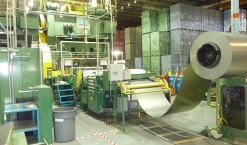

You can never overstate the importance of optimal cleanliness and sanitation at a packaged foods plant, and these days more and more suppliers of food-packaging products are starting to do their part in cleaning up the food industry’s extensive supply chain.
That is certainly the case at Ball Corporation’s canmaking facility in Richmond, B.C.—part of the Broomfield, Colo.-headquartered company’s Metal Food & Household Products Packaging Division—which supplies virtually all of the metal cans used to package processed salmon products in Canada, while also accounting for about half of all the canned salmon in the State of Alaska.
“We opened our Richmond plant in 1985 as part of a continuation of the canmaking tradition in the Greater Vancouver area that dates back about 100 years through the previous owners—American Can and Onex Packaging,” explains Ken Friend, the plant’s quality assurance manager with over 30 years of experience with Ball and its corporate predecessors.
Employing 35 people, the 194,000-square-foot Richmond facility houses two production lines to manufacture five different-sized metal cans—ranging from the quarter-pound straightwall cans to the one-pound cans used by restaurants—for the West Coast salmon industry.
“The cans we produce here—made of PET (polyethylene terephthalate)-laminated, tin-free steel (TFS)—are manufactured by the draw/redraw method in our Minister presses,” Friend told Canadian Packaging in a recent interview, describing the plant’s highly automated production flow that ensures the human hands never actually touch the cans throughout the forming process.
“The lids are manufactured at our sister Ball facility in Oakdale, California, and are shipped up to the Richmond plant before shipping out with the can directly to the client,” says Friend, citing Canadian Fishing Company—Canada’s largest provider of wild salmon and herring roe—and Ocean Fish as the plant’s biggest Canadian-based clients, along with the U.S.-based customers such as Trident Seafoods Corporation, Icicle Seafoods, Inc. and Alaska General Seafoods.
Although Ball only entered the Alaska market in 1991, it quickly earned and maintained a dominant market share in the state in large part thanks to its emphasis on clean production environment and processes, Fried contends.
Total Care
“I think a part of that success is due to the fact our customers know we care about them,” says Friend. “Sure we could just make a package for them, but we want to ensure the package comes from a clean and safe environment.
Advertisement

